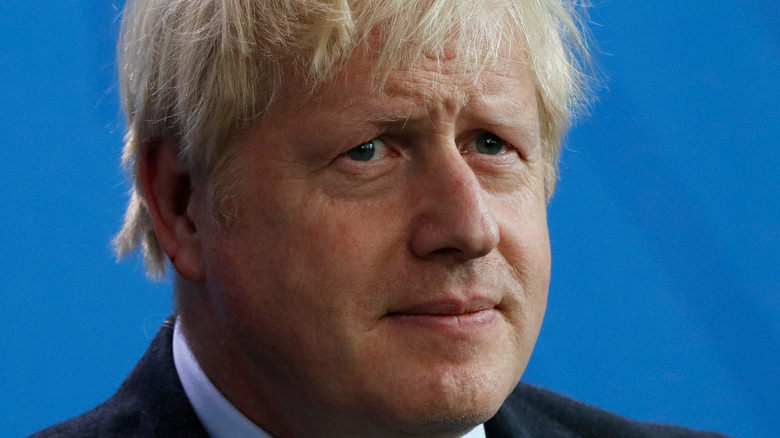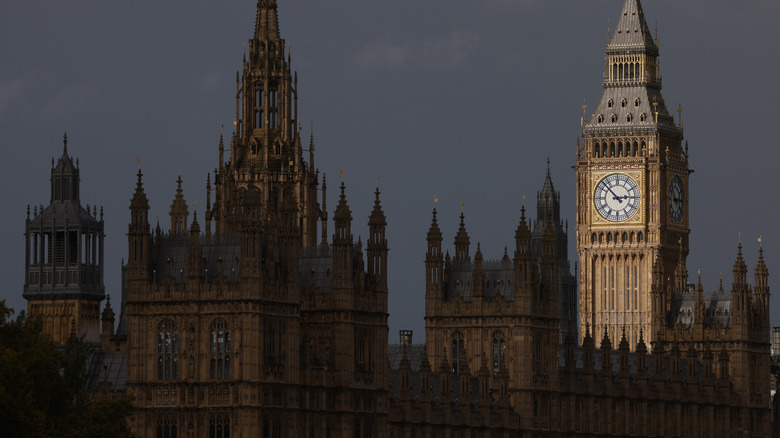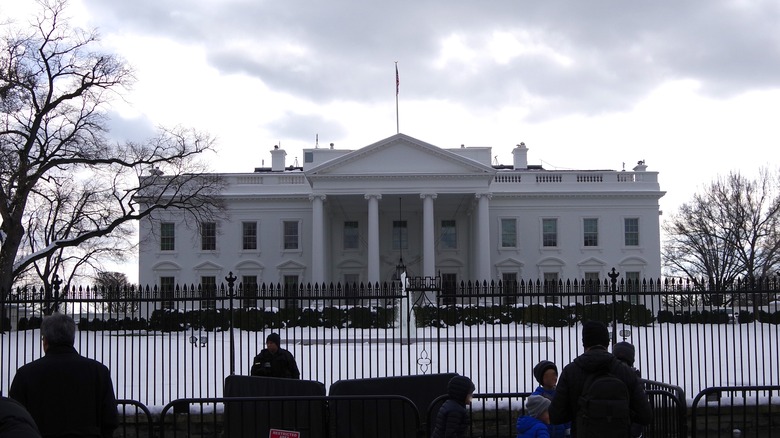The Differences Between Political Resignations In The UK And The US
Like most nations, the U.K. has its own political controversies involving its government. One controversy occupying the news is the resignation of two prime ministers in seemingly rapid order. As The New York Times reports, Prime Minister Liz Truss resigned a mere 44 days after taking office, making hers the shortest tenure of any other prime minister in Britain. Truss belongs to the Conservative Party of the United Kingdom, which is currently embroiled in its own buffet of controversies and scandals. She took office after Boris Johnson (above) stepped down amid his own cloud of scandal.
Truss came into the position as a deeply unpopular candidate amid a highly unstable, tumultuous parliament. Her policies were not supported and her party had been torn to splinters from deeply sown division. There is now a mad dash to find her successor, though no one knows who that may be or where they may come from (via CNN). But how come resignations by national leadership are far more common in the U.K. than the U.S.? In that respect, are there differences between the two nations?
What is a political resignation?
Here's a scenario: Let's say the duly elected leader of a country turns out to be woefully unpopular and their political peers want them out. What should happen next? It depends on the country, as the process can be wildly different. In cases like the U.S, there's not much one can do outside of impeachment or hoping the person steps down gracefully. In the U.K., however, a prime minister can be dumped by their political colleagues, leading to the prime minister resigning (via The Washington Post).
A resignation is when an elected leader decides to formally leave office. As Time explains, in the United States, this process can often be difficult, if not impossible. As is the case with many legislators or people in power in the United States, often mass protest and scathing critique aren't enough to get someone ousted. They remain rooted in place and critics must wait, hopeful that the electoral process will swing in their favor.
How political resignations work in the US
Political resignations in the United States are fairly difficult and go through complicated processes. As a Bloomberg editorial explains, presidents have considerable power in deciding whether they stay or leave. For starters, to force a resignation of a U.S. president means going through impeachment. Britannica says that impeachment is essentially the process of legislative bodies determining that an elected leader is unfit to occupy the position.
The process starts with a majority vote in the House of Representatives to charge a politician. This impeachment charge then must go through the Senate, which involves a lengthy court process to determine if the charges are legitimate. Two-thirds of the Senate must agree to impeachment in order to remove the official from office. According to History, only three U.S presidents have been impeached, meaning the process is often not a surefire way of getting any official removed from office.
How political resignations work in the UK
In contrast to the process in the United States, the United Kingdom can actually come to an official's resignation in a much more streamlined way. As the Bloomberg editorial says, some places like Finland, Sweden, and the U.K. can see a resignation quite easily if a sitting prime minister is deeply unpopular within parliament. In the U.K., Boris Johnson's own cabinet members quit, putting aside some allegiance to him, ousting him as a party embarrassment. This was all strategic, of course, as the U.K.'s Conservative Party seeks to improve their image and boost election results.
As The Washington Post explains, U.K. parliament members can enact a confidence vote, in which members of parliament vote on whether current government officials should stay in office or be ousted. In Johnson's case, a confidence vote was held against him earlier in the year, but members of his own party decided against it to his favor (via BBC). This didn't last long, however, as his slew of scandals and unpopularity soon lead to his resignation.
What are some problems with both systems?
Keeping the differences between U.S. and U.K. government in mind, what are some of the more glaring issues of both systems? In the U.K., resignations happen far more often than the U.S., but can still result in an unstable and deeply unpopular government replacement. According to NPR, the U.K. has had five different prime ministers in the short span of six years. Americans familiar with their own elections will be used to having one or two presidents within a six-year time frame.
In the case of the U.S., extremely unpopular, highly divisive presidents like Donald Trump often get to ride out their entire terms, despite impeachment. As Vox explains, Trump getting ousted from office was always practically a pipe dream. Despite impeachment, it required a two-thirds vote by the Senate to remove him from office. There were too many GOP members on the side of Trump who voted against conviction, which works against the two-thirds vote needed for anything to stick.
What are some solutions to these problems?
Both systems lead to some headache-inducing problems. It's a complicated situation, but some fixes have been proposed. As an opinion piece on Bloomberg suggests, the U.K.'s system of parliament members being able to replace elected national leadership seems like a much better option. If Congress, and in turn the country, believe the president isn't doing a good job, the process should be more streamlined for removing them from office. Another issue is the two-party system, though this also affects the U.K. a fair bit, as a good chunk of U.K. government has been led by either Labour or Conservative party membership (via The Washington Post).
Another issue with U.K. parliament is that many democratic processes are often put through convoluted channels of self-interested bureaucracy. As Quartz says, electoral reform is also on the plate, as many times, voters are often not fairly represented, with many votes actually not mattering in elections to begin with. U.K. parliament is deeply fragmented, and constant resignations are just a major byproduct of a root issue at hand.





